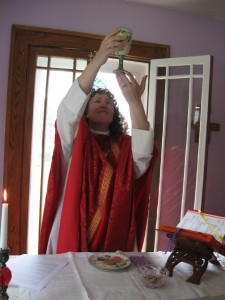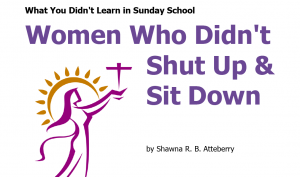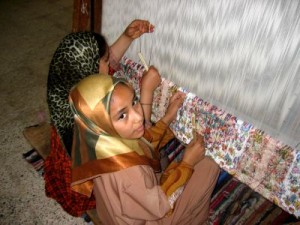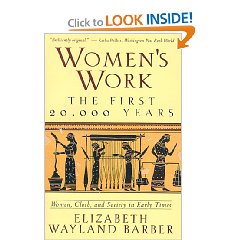The Proverbs 31 Woman: Dame Wisdom in Action
The Proverbs 31 Woman: Dame Wisdom in Action
Proverbs 31:10-31
Ah, the Proverbs 31 woman, let me count the ways I hate thee. I grew up hearing about this woman every Mother’s Day. How she was a good and submissive wife who obeyed her husband and took care of her kids and was happy with her life in the home. If you come from a conservative or fundamentalist Christian background like I did, you know what I’m talking about. Every single Mother’s Day the male pastor brushes off this passage and preaches how a good Christian woman ought to act. She’s the best wife, mother, and homekeeper of them all. She eschews the public sector to take care of her home and family. She keeps her house clean, obeys her husband and submits to him. She is a wonderful mother, and gets the meals on the table on time. She’s SuperWifeMom.
By the time I hit my teens I was groaning and tuning the pastor out. By the time I hit my early 30s, I was single, not too sure if I wanted to get married, and I knew I didn’t want do the whole kids thing. I stopped going to church on Mother’s Day. If there was one Saturday I conveniently forgot to set my alarm clock and not make it to church, without feeling guilty about it, it was Mother’s Day.
Unfortunately for the conservative evangelical background I grew up with, it was beat into my head that every good Christian reads the Bible for herself. She sees what is there, so she won’t fall into error. This backfired where I am concerned. I did read my Bible. I wanted to know what it said, and how I should act. And I noticed something. I noticed that what I heard all those years about the Proverbs 31 woman was not all of the story. In fact most of what I heard wasn’t even in the story! This woman was not restricted to her home and family. I got to know an entirely different women when I read her story for myself.
This woman is a household manager, industrious, produces and sells textiles, brings in income for the family, oversees planting of a vineyard and uses her own money to set it up. She has servants she oversees, she gives to the poor, and her household is a small business that provides for her family, and her husband is praised for it. This is not the picture of the stay-at-home mother that is normally depicted in sermons. She works both inside and outside of her home.
I learned there is a big difference when the Bible talks about a wife and how we talk about a wife, particularly a housewife. Carole Fontaine said this about that difference:
In the Bible, the term wife encodes a set of productive and managerial tasks that, along with a woman’s reproductive role, were essential to the existence of the Israelite household. There is no equivalent understanding of “wife” as a social category in the modern West, where women’s household work does not usually contribute to the family economy and tends to be ignored, trivialized, minimized, or otherwise degraded. The often insulting idea of “just a wife and mother” would have had no meaning in the biblical world.
Or as Rabbi Rosenfeld said at the beginning of his lecture on Proverbs 31: “First of all, let’s get one thing straight. Women have ALWAYS worked outside the home, and EVERY mother is a ‘working mother!” Women’s work was necessary for the survival of the family, and she generated income for the family. Textiles—the spinning, weaving, and making of fabric goods–drove the ancient economy for 20,000 years. Women’s work was the backbone of the ancient economy and the ancient household. And I will love Deirdre McCloskey forever for pointing that out to me. So this woman was much more than the imaginary 50s housewife some segments of Christianity hold up as the good Christian wife. I’m not hating her as much.
Then I discovered something about her this week that I never knew, and I may just be darn close to falling in love with her. While reading up on this passage one of the writers pointed out that this poem is filled with military imagery. In fact the word translated as capable in “a capable wife who can find?” is hayil. When it’s used for a man it’s translated as “strong” or “mighty,” and it’s normally used in the context of war. It also means the power that is able to acquire strength through gaining money and raising an army. Right off the bat, we are told this is a strong woman who knows how to get things done.
Then verse 11 says: “[her husband] will lack no gain” or spoils or booty. The writer, Raymond Van Leeuwen notes that using this word here is strange because it “suggests the woman is like a warrior bringing home booty from her victories.”
In verse 16 she “considers a field and buys it.” Here the word “buy” may not the best translation of the Hebrew. Literally, she “takes” the field, and this word is normally used of an army taking a city or a region. It means to conquer and subdue a territory. This verse shows the woman looking at a wild field and figuring out how to tame it and subdue it into a vineyard. In the Judean highlands turning a plot of land into a vineyard took a massive amount of work. The soil was rocky, and all of the rocks had to be removed, then the land terraced, and the rocks built into a wall, so that the vineyard didn’t wash down the hillside at the first good rain. It also had to be terraced to make sure that enough water stayed in the vineyard so the vines could grow. Like a general this woman surveys her battlefield and plans her attack. Anyone who has ever gardened knows this is not an over-exaggeration.
Verse 17 has the most obvious military language: “she girds herself with strength, and makes her arms strong” or in the good old King James Version, she “girded up her loins.” Men normally girded up their loins in the Bible for a heroic deed; a deed that involved fighting. Having a strong arm is another Biblical metaphor for being battle ready.
The end of the poem comes back to where we began with the word hayil. In verse 29 the woman’s husband tells her: “Many women have done excellently, but you surpass them all.” Here hayil is translated as “done excellently.” The woman has done deeds of strength and power that again refer to warfare and gaining wealth. “Surpass them all” is another idiom for military activity–as in the army met the enemy and bested them.
So we see that this woman is not only pictured as a manager, entrepreneur, and merchant, she is also pictured as a military leader. There is nothing submissive or docile about this woman. She makes textiles, buys, sells, and fights for her family’s survival and good. And yes, she still sounds like SuperWoman. But there is a reason for that. Just as this woman is not the fictional housewife of the 50s, she is also not just a woman either.
I’ve always wondered why Proverbs 31 ended with this poem about this woman. So have others. It seems odd. And after all the focus on wisdom and gaining it, why does this book end with a woman going about her mundane daily activities? Part of the answer to this is how the Jewish sages defined wisdom. Wisdom was not just knowledge gained for knowledge’s sake. Wisdom was knowledge that was to be applied to everyday life. In the Bible God created the world and set boundaries and laws to govern what she created. Wisdom sought to define those boundaries and apply those laws to their daily lives. This woman is living wisdom.
But there is another reason why this book ends with a woman. It began with one. At the end of Proverbs 1 we are introduced to Dame Wisdom. We find out that Wisdom was with God when God created the heavens and earth. In fact, She was the master designer and architect of creation. She watched God bring order out of chaos. She rejoiced in creation, and calls out in the public square and city gates for men and women to follow her. She wants us to learn Her ways, so that She can give us good lives. She builds a house, prepares a feast, then goes out again to call everyone to come into Her house, eat Her feast, and learn Her ways. She continues to create and bring order to the world. After the tabernacle and temple are finished in the Hebrew Scriptures, there are huge feasts for all the people to celebrate. Wisdom does the same. She builds Her house then invites everyone over to celebrate. The last thing we hear about in Proverbs 9 is Dame Wisdom.
And the last thing we hear about in the book of Proverbs is the Wise Woman in the 31st chapter. The reason Proverbs ends with this woman is that it is showing us Dame Wisdom in action. This woman does everything Wisdom does in earlier chapters: she creates, brings order to chaos, feeds and clothes her family, and takes care of the poor. She doesn’t just live wisely, she is Wisdom Incarnate. These verses do not describe what the typical woman of that day is like. They are showing us Wisdom hard at work in the everyday world.
She shows us what we are called to do. Just like Dame Wisdom and the Wise Woman of Proverbs 31 we are called to live wisely in our everyday, mundane lives. We are called to learn what God wants, where our boundaries are and live by that everyday. For ancient Israel the boundary was there is only one God, YHWH, and YHWH alone will you worship and obey. For us as Christians our boundary is to love God with all our heart, soul, strength, and mind and to love our neighbor as ourselves. That is our boundary. Day by day we have to figure out how to live that love at home, at work, in the store, on the sidewalk, and at church. Within the boundary of that love, we are called to create, to order the chaos around us, to build God’s realm and to celebrate God’s reign here on earth. Or as Elizabeth Barrett Browning put it:
And truly, I reiterate, . . nothing’s small!
No lily-muffled hum of a summer-bee,
But finds some coupling with the spinning stars;
No pebble at your foot, but proves a sphere;
No chaffinch, but implies the cherubim:
And,–glancing on my own thin, veined wrist,–
In such a little tremour of the blood
The whole strong clamour of a vehement soul
Doth utter itself distinct. Earth’s crammed with heaven,
And every common bush afire with God:
But only he who sees, takes off his shoes,
The rest sit round it, and pluck blackberries,
And daub their natural faces unaware
More and more, from the first similitude.
Our call is to see God in our world and then live what we see. When we follow Wisdom and listen to Her, our eyes will be opened, and we will see the holy in everything. When we see the holy all around us then we will know how to live our own lives and show that holiness, God’s love, to others.
Originally posted on September 22, 2009.
Related Posts
Sermon Meanderings: The Proverbs 31 Woman
Proverbs 31: A “Capable” Wife, Huh?
Poem: In the Beginning Was





